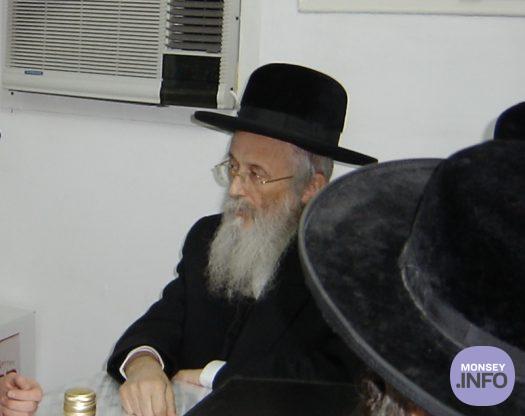
Rabbi Yitzchak Tuvia Weiss, 95, Holocaust Survivor and Senior Jerusalem Rabbi
by Mendel Super – chabad.org
As the head of the Eida Hachareidis rabbinical court in Jerusalem since 2003, Rabbi Yitzchak Tuvia Weiss was among Israel’s most revered and influential Torah authorities and communal leaders, a consummate scholar who previously served as one of the rabbis of the Jewish community in Antwerp, Belgium. His lofty positions notwithstanding, Rabbi Weiss was a personable, humble man who had a special place in his heart for hachnasat kallah (helping young couples with wedding expenses). He passed away on July 30 at the age of 95.
“He got along with every part of the community,” Rabbi Zalman Spitezki, a Chabad-Lubavitch emissary in Baltimore and a native of Antwerp, Belgium, tells Chabad.org. Having grown up in Antwerp’s Chabad-Lubavitch community, Spitezki notes that Rabbi Weiss was close with all segments of Antwerp’s wider Jewish community, serving as a bridge between communities. “He was above politics,” says Spitezki. “He exemplified humility; he was quiet and unassuming, he didn’t make much of himself.”
Spitezki recalls Rabbi Weiss frequently participating in gatherings and events at the local Chabad center. “He came to my bar mitzvah celebration. I still have a book that he gifted me.”
Rabbi Yitzchak Tuvia Weiss was born in Pezinok, a town near Bratislava, Czechoslovakia (today, Slovakia), to Rabbi Shlomo and Rikel Weiss. His father was a lumber merchant and a Torah scholar, a disciple of 19th-century rabbinic leader, Rabbi Simcha Bunim Schreiber, known as the Shevet Sofer.
In 1939, at 12 years old, he was whisked away from the impending doom to London on the Kindertransport. He later wrote to the family of Sir Nicholas Winton, the British humanitarian who helped rescue the 669 children, saying that Winton had “[saved] my life as well as a large number of other people. His noble memory, courage and devotion will be with us forever and can serve as a consolation to you.”
An orphan whose parents lost their lives in the Holocaust, Rabbi Weiss grew up in the home of Rabbi Simcha Bunim Rubin, the Sassover Rebbe of London, and studied at yeshivahs there and in Gateshead. After his marriage, he stayed in Gateshead and then moved to London, where he taught in a local yeshivah and served as the rabbi of a synagogue.
It was in London where Rabbi Weiss first connected with Chabad. The city was home to several great Chabad Chassidim who had fled the USSR, including Rabbi Benzion Shemtov and Rabbi Mendel Futerfas. In his memoirs, Rabbi Weiss recalls the impression these Chassidim made on him: “Each of them could have been a Rebbe in his own right,” he wrote. Recalling his weekly Tanya study session with Rabbi Futerfas, Thursday nights at 2 a.m., he wrote: “The truth is I didn’t arrange it only to learn Tanya with him; I mainly wanted to hear his stories of self-sacrifice in Siberia … . ”
In a 2015 interview with Kfar Chabad Magazine, Rabbi Weiss noted that every time he visited the United States, he made sure to meet the Rebbe—Rabbi Menachem M. Schneerson, of righteous memory. His last meeting with the Rebbe was just one day before the Rebbe’s stroke in the winter of 1992. The Rebbe gave him three dollars for charity: one for him, one for his family, and one for the rabbinate, the Rebbe wishing him many years of service.
Rabbi Shabtai Slavaticki, director of Chabad-Lubavitch of Belgium, told Kfar Chabad about his many interactions with Rabbi Weiss over the years. Slavaticki would send certain halachic questions to Rabbi Weiss, often questions he had posted to the Rebbe and to which the Rebbe responded to ask a local rabbi. In one memorable incident, a newly observant woman came to his wife, Richa Slavaticki, with a difficult and sensitive question. The Slavatickis referred it to Rabbi Weiss, who after patiently hearing out the woman’s question ruled that it was best to be stringent.
The woman was not happy with this ruling, saying that either it’s forbidden or it’s permitted, why was the rabbi being stringent with her, someone not on the level of stringency?
When her response reached Rabbi Weiss, he deliberated again, finally finding a way to rule leniently. But the rabbi didn’t suffice with that alone, he sent his apologies for initially being strict, explaining that it wasn’t because he didn’t want to help her; it was because the issue was such a severe one. But as soon as he became aware of her personal circumstances, he took the time to find a leniency.
“He wasn’t only great in Torah scholarship but he excelled in his generosity and sensitivity,” said Slavaticki. “He was a true ‘mentsch.’ ”
Rabbi Yitzchak Tuvia Weiss was predeceased by his wife and is survived by his son, Rabbi Shlomo Zalman Weiss, daughters, grandchildren and great-grandchildren.
This article has been republished with permission from chabad.org









